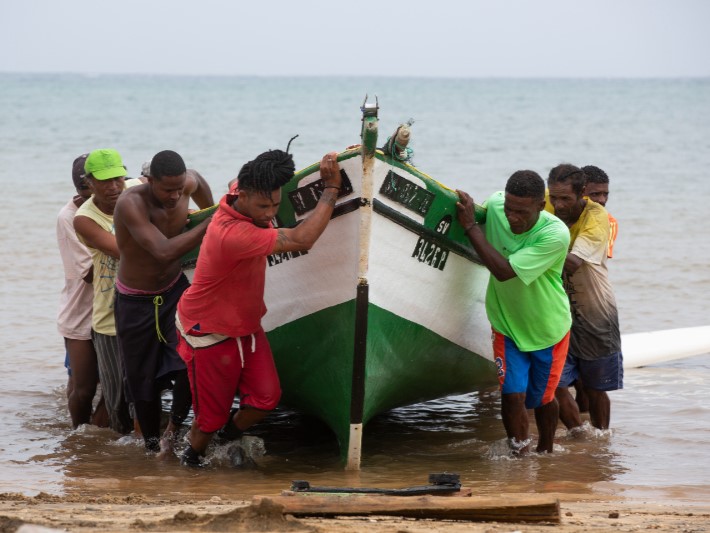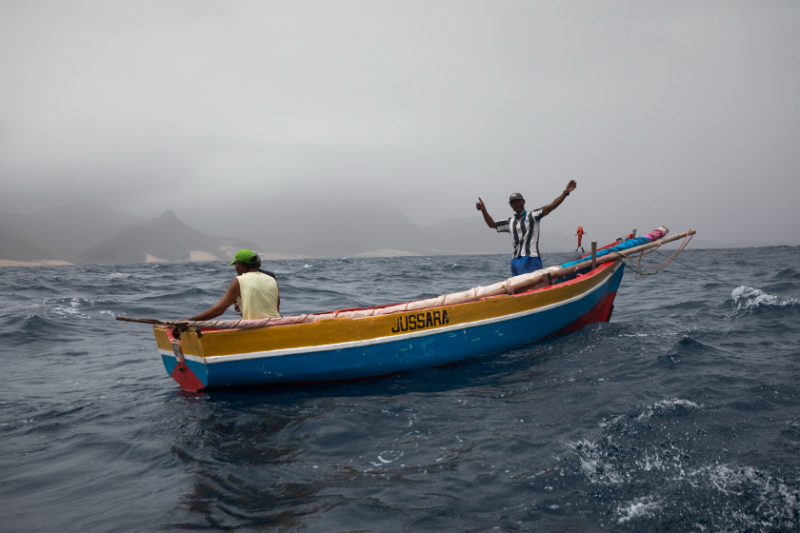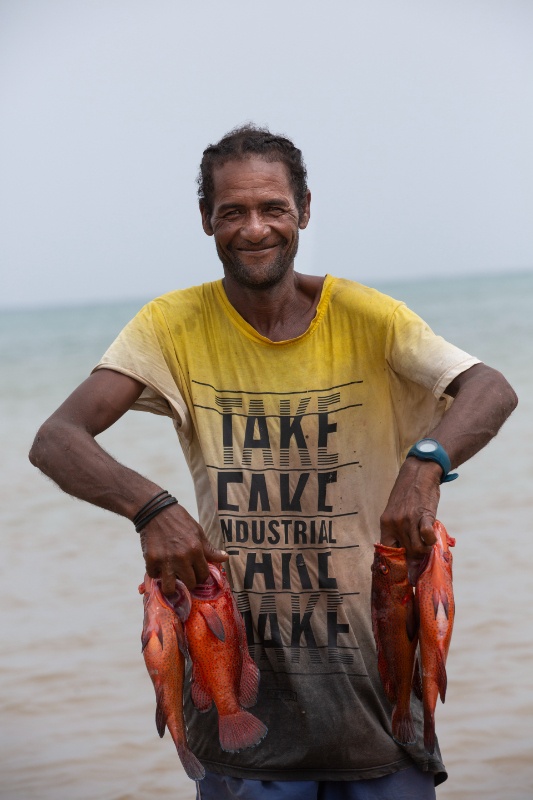Safeguarding marine resources

Fishers returning from the sea after a long day's work in Baía das Gatas, São Vicente Island. Credit - Biosfera.
Guardians of the seas: Putting communities on the frontline of safeguarding marine resources
The engagement of fishing communities is vital for the conservation of Cabo Verde’s marine resources. Since 2022, BirdLife International has supported the expansion of an innovative citizen science approach in Cabo Verde that puts fishing communities at the heart of marine conservation. This approach empowers members to act, monitor, mitigate, and report bycatch incidences on marine megafauna in fisheries activities. The implementation of the Guardians of the Sea (GOS) approach is ensured through the project "Empowering Cabo Verde communities towards responsible practices in artisanal fisheries”, a conservation initiative coordinated by BirdLife International. In particular, the GOS approach is being implemented and promoted on various islands in Cabo Verde and facilitates the capacity development and engagement of local communities in marine conservation efforts.
The West African marine ecosystem is both a biodiversity and a fishing hotspot. For many years, concerns have been raised about the impacts of fishing activities (both industrial and artisanal) on species. Limited data have shown that the intensive commercial fisheries associated with bycatch could bring vulnerable migratory species such as seabirds, sea turtles, and sharks to the brink of extinction, as the species are most vulnerable to bycatch due to their movement across international waters.

Further, the marine ecosystem is under various pressures such as overfishing by commercial fishing, which has led to a drastic reduction in daily catch for artisanal fisheries and impacted on the marine megafauna species. According to a 2020 study, it is estimated that there are around 5,000 artisanal fishers operating in the country. During the period, 77% of fishers had seabirds (mainly Cape Verde shearwater) as bycatch, 55% caught turtles, and 86% caught sharks.
This has had a negative impact on biodiversity, contributing to localised extinctions of endemic seabird species. Further, bycatch reduces fishing efficiency as releasing non-target species takes time in addition to bait loss, and fishing gear damage.
Implemented by local NGOs, including Biosfera (BirdLife Partner in Cabo Verde), Projecto Vito (PV), and the Associação Projeto Biodiversidade (APB), the GOS programme addresses the bycatch of vulnerable marine species such as seabirds, sea turtles, and sharks by empowering members of the local artisanal fishing community to act on, monitor, mitigate, and report incidences in fishing activities.
"The Guardians of the Sea are fishermen who have become the voice of our oceans, committed to protecting endangered species and advocating for sustainable fishing practices.”
To date, the programme has successfully engaged more than 150 fishermen across the archipelago. The fishermen have been trained on standardised bycatch data collection, marine species identification, boat tracking, understanding the marine food chain, and reporting fishing incidents such as the illegal, unreported, and unregulated (IUU) fishing activities. In addition, the fishers have received trainings to implement bycatch mitigation measures including safe release and handling of species bycaught during fishing activities.
Additionally, communities are incentivised through provision of fish handling and preservation systems, and improved safety systems among others. This equipment has contributed to reduce the plastic pollution at sea and the post capture losses, increasing the financial benefits of fishers. In parallel, an innovative labelling scheme involving the NGOs, local restaurants, and fishers is being developed with the aim of establishing a sustainable local label that will help restaurants be greener while increasing income for fishers.
“For me, GOS has been very beneficial after almost a year in the programme. The various training courses have enriched my knowledge in seabird identification and the use of equipment like radios and GPS. We are now more aware of species conservation and fishing regulation”, said Manual Gomes Tavares, a GOS member from Fogo Island.

An immediate direct impact of the GOS Programme in Cabo Verde, has been a decrease of marine megafauna bycatch reported during fishing activities thanks to the use of simple mitigation techniques such as bait changing and bird-scaring devices combined with adequate safe release and handling skills of bycaught animals.
“The Guardians of the Sea are fishermen who have become the voice of our oceans, committed to protecting endangered species and advocating for sustainable fishing practices”, says Thais Macedo, Marine Programme Coordinator at Fundação Maio Biodiversidade (FMB). The FMB is a local conservation NGO which implemented the GOS approach for the first time in Cabo Verde in 2016 with the aim to strengthen ownership and engagement of fishermen in the protection of the marine environment
Soon after, BirdLife and its partners expanded this initiative and established five GOS programmes on other islands in the Cabo Verde Archipelago including Sal, Boa Vista, São Vicente, Fogo, and Brava.
“The GOS are becoming more responsible for the surveillance, monitoring and preservation of the sea and its resources, they are no longer playing a passive role and waiting for others to do it for them and are beginning to protect their own resources”, notes Keider Neves, Sustainable Fishing Project Coordinator at Biosfera.
"Implication of fishers in the conservation of the marine life is a key [stone] of our marine strategy. Lessons learnt from the Cabo Verde experience will help us in our aim to expand such initiative in the West Africa region and beyond."
The adaptive and community driven approach allows for continuous adjustments and close exchange with local communities, to ensure that the initiative is meaningful and adequate, reflecting realities on the ground. Consequently, some adjustments have been made, for example the use of voice recorders and photos for the identification and recording of bycatch incidents, as fishers often face difficulties collecting information in written form.
The success and positive feedback that is received for the GOS programme in Cabo Verde has also led to consideration of expanding the GOS programme to other countries in West Africa such as Senegal, Mauritania, Guinea-Bissau, and beyond. “Implication of fishers in the conservation of the marine life is a keystone of our marine strategy. Lessons learnt from the Cabo Verde experience will help us in our aim to expand such initiatives in the West Africa region and beyond,” concludes Ahmed Diame, Sustainable Fisheries & Bycatch Reduction Manager at BirdLife International.
Written by Iderlindo Santos, Ahmed Diame, and Tabea Zwimpfer. For more information on this Darwin Initiative Main project 29-009, led by BirdLife International, please click here.

 Back
Back